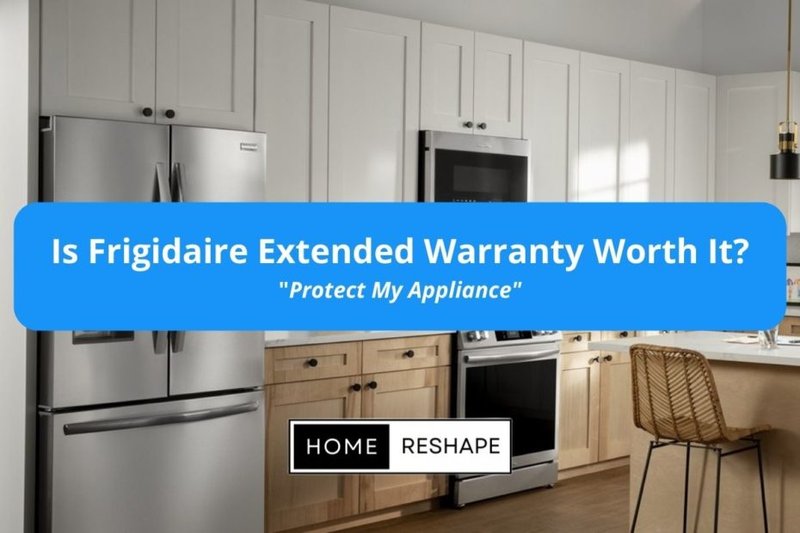
Think of an extended warranty like an umbrella on a cloudy day. You might not need it, but if the sky opens up, you’re glad you brought it along. The catch is, not every cloud brings rain, and not every kitchen appliance will break down. So, is the extra coverage really worth it for Frigidaire appliances—especially when you’re balancing peace of mind against more money out of your pocket? Let’s break it down together, step by step.
What is an Extended Warranty for Frigidaire Kitchen Appliances?
Let me explain what we’re really talking about when we say “extended warranty.” When you buy a new Frigidaire kitchen appliance (like a fridge, oven, or dishwasher), it almost always comes with a standard manufacturer’s warranty—usually lasting one year. This covers things like manufacturing defects, faulty parts, and sometimes labor for repairs. But once that year is up, you’re flying solo.
That’s where the **extended warranty** comes in. It’s extra protection you can buy—either from Frigidaire itself or from third-party companies—that kicks in after the original warranty ends. Usually, it covers the same types of things: sudden breakdowns, specific part failures, or certain types of damage. Sometimes, it even adds perks like in-home service or faster repairs.
Here’s the thing: extended warranties aren’t all created equal. The exact details—like which parts are covered, labor costs, or exclusions—can vary a lot depending on who’s selling it. With Frigidaire, you might get a plan that’s super specific, covering just the basics, or one that’s more all-inclusive. It’s a bit like syncing a universal remote—you have to check the code and make sure it pairs with your needs.
But above all, an extended warranty is like a safety net. It’s there if something goes wrong after the first year. The trick is figuring out if that net is sturdy enough—and if you’ll actually need it.
Why Do People Consider Extended Warranties for Appliances?
Honestly, buying an extended warranty often comes down to fear—or at least, a healthy dose of caution. Appliances can be expensive, and nobody likes the idea of their brand-new Frigidaire stove suddenly dying after just 13 months. The cost of repairs, parts replacement, or even calling out a technician can add up fast.
You might be wondering, “Is this just a money grab, or am I really at risk?” Here’s what usually goes through someone’s mind:
- Peace of mind: Life’s busy. If you don’t want to worry about unexpected breakdowns, a little extra insurance can help you sleep at night.
- Complexity: Modern appliances are packed with electronics. It’s not just a burned-out lightbulb anymore—it might be a control board or a digital display needing a reset or replacement.
- Repair costs: Fixing a fridge or oven can sometimes cost almost as much as buying a new one, especially if special parts or expert troubleshooting are involved.
- Bad timing: Murphy’s Law says that if your dishwasher is going to break, it’ll probably be right before a big holiday meal or when you’re expecting guests.
In the end, extended warranties let you pay a little more now to avoid a possible big bill years down the line. But whether that gamble pays off depends on a few more details.
What Do Extended Warranties Actually Cover?
This is where things can get a bit tricky—like reading the fine print before you pair a new remote. Most Frigidaire extended warranties (and similar plans from third parties) are built to cover mechanical or electrical failures that aren’t your fault. For example, if the oven’s heating element fizzles out or the control panel on your fridge stops working, that’s normally included.
But there are limits. Here’s what you can usually expect:
- Parts and Labor: Most plans cover both the cost of the part and the technician’s fee to repair or replace it.
- Power failures: If something short-circuits, that’s typically included—unless it was caused by a home wiring problem or a power surge.
- In-home service: Big appliances (like refrigerators or built-in ovens) usually get fixed right where they are, rather than you hauling them in somewhere.
But here’s the catch: many things aren’t covered. If you accidentally drop a pizza on the stovetop and crack the glass, or if the issue comes from improper installation, you’re probably out of luck. Consumables, like lightbulbs or water filters, are almost never covered. And if you try a DIY fix and end up making things worse, that can also void the warranty.
It’s a bit like troubleshooting your remote: if you follow the instructions, you’re fine, but if you start randomly pressing buttons hoping for the best, things can go sideways.
How Much Does an Extended Warranty Cost for Frigidaire Appliances?
Let’s talk numbers, since the decision often comes down to dollars and cents. The price of an extended warranty for a Frigidaire kitchen appliance depends on what you’re buying and how long you want coverage.
For example:
- A single appliance (like a dishwasher or fridge) might cost anywhere from $50 to $200 for a two- or three-year plan.
- A full-coverage plan that includes multiple appliances or longer terms (up to five years) can run $300 or more.
- Third-party providers sometimes offer monthly payment options—but watch out for extra fees or less flexible coverage.
Sometimes, the cost of the warranty is a small percentage of the appliance’s price. Other times, it creeps up to 20% or more. You really have to weigh that against the potential cost of a repair. For example, a new compressor for your fridge might set you back $450, while a new digital control board could be $300 with labor.
The key question becomes: are you paying for coverage you’ll actually use, or just for peace of mind?
Do Frigidaire Appliances Actually Need Extended Warranty?
You might be surprised to learn that most large kitchen appliances—Frigidaire included—are built to last. It’s not uncommon for a fridge or oven to keep chugging along for 10+ years with just basic care (like resetting after a minor power blip or changing a filter). Modern models can be a bit more complex, with circuit boards and digital displays, but the core mechanical parts are pretty sturdy.
So why do some people still swear by extended warranties? Well, it really comes down to a few factors:
- How much you use it: If you cook every night, your oven gets a lot more wear and tear than someone who mostly orders takeout.
- Luck (or lack of it): Sometimes, a random defect slips through, and your appliance just happens to be the unlucky one.
- Your tolerance for risk: If the thought of a sudden $350 repair bill gives you hives, an extended warranty is a safety net.
For many Frigidaire appliances, especially higher-end or “smart” models, the risk of needing a costly repair in the first few years is pretty low. But as electronics get more complex, having backup coverage starts to make more sense—kind of like having a spare battery for your remote, just in case it goes dead at the worst possible time.
Are There Alternatives to Buying an Extended Warranty?
Here’s the thing: buying an extended warranty isn’t your only option. Some folks prefer to take matters into their own hands.
- DIY “repair fund”: Set aside the money you would’ve spent on a warranty and use it for potential repairs down the road. If nothing breaks, you get to keep your cash.
- Home warranty plans: These cover more than just kitchen appliances—they can include HVAC, plumbing, and even some electrical systems. It’s often a bigger safety net, but with a higher price tag (and sometimes more exclusions).
- Consumer protections: Depending on where you live, credit card companies or consumer laws may offer some repair or replacement protections if your new appliance dies early, especially if you paid with a premium credit card.
Now, this approach requires a bit more effort—you’ll need to troubleshoot issues yourself, find reputable repair techs, and keep your receipts. But it puts you in the driver’s seat, rather than relying on a company to process the claim on their timeline.
How To Decide: Is Extended Warranty Worth It for Your Frigidaire Appliance?
So, here’s where it all comes together—it’s decision time. Ask yourself these questions as you sip your metaphorical (or literal) coffee:
- How reliable is the specific Frigidaire model you’re buying? Are there lots of complaints online, or does it have a solid track record?
- How long do you plan to keep the appliance? If you’ll move in a year or two, the warranty might not even apply.
- Are you comfortable troubleshooting simple issues, like resetting the display or replacing a water filter, on your own?
- How much would a typical repair cost, and does that outweigh the price of a warranty?
- Is your peace of mind worth the upfront price?
If you’re buying a high-end refrigerator loaded with smart features—or you simply dread the thought of appliance troubleshooting—then the extended warranty might make sense. On the other hand, if you’re the sort of person who always keeps the manual handy, knows how to reset a control board, and isn’t afraid to compare repair prices, you might be better off skipping it.
When it comes to extended warranties, there’s no universal right answer. It comes down to your comfort level, the appliance itself, and whether you’d rather pay a little extra now or risk a bigger surprise later.
Final Thoughts: Weighing Protection Versus Probability
Deciding whether an extended warranty is worth it for your Frigidaire kitchen appliance is a little like deciding whether to buy travel insurance before a vacation. Most trips go off without a hitch, but every now and then, trouble finds someone.
The best advice? Take a close look at the appliance you’re buying and your own preferences. Understand what’s covered (and what’s not) before signing up for any protection plan. Sometimes, the real value is in the peace of mind, especially for high-tech or expensive models that might cost a fortune to fix.
In the end, it’s your kitchen, your budget, and your appetite for risk. Whether you go for the extended warranty or trust your luck (and maybe your troubleshooting chops), just make sure you’re comfortable with your choice. That way, when you’re cooking dinner or grabbing a snack, you’ll have one less thing to worry about—no matter what the warranty says.
